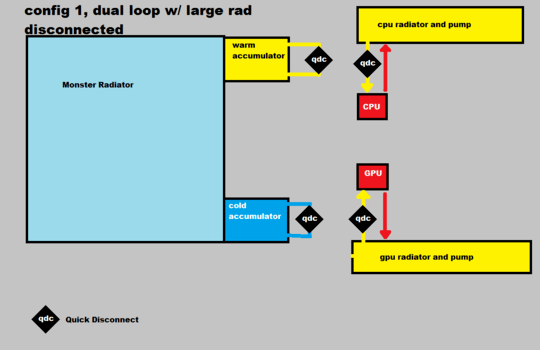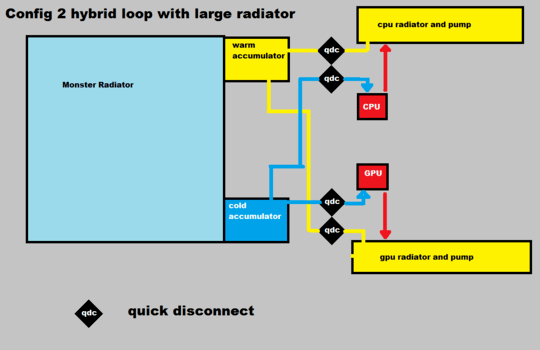3
3
I have decided to switch to water cooling my PC. I've got a asus x99 deluxe with an intel i7 5930k CPU, 16 gigs of corsair dominator 2800mhz memory and a nvidia Titan X with an EVGA hybrid water cooling kit.
I live in alaska where our winters tend to get pretty cold. I've wanted to try sticking a car radiator with a fan outside at -20F and hook it into a hybrid dual loop setup like this:
I understand that the additional complexity and length of tubing may require me to add an additional pump when the large radiator is attached.
If the plan is feasible I would also add insulation to the coolant lines so I would not get condensation from the sub zero coolant lines in the computer sitting inside.
my actual question is: Am I likely to see gains at least 20% beyond what I can do with a typical dual loop setup?
I'm sure the radiator would be able to get the coolant significantly colder from being outside in the freezing cold, but will I be running into other barriers like maximum voltage or clock limitations of the chips themselves that would render the additional cooling redundant?
Thanks


I clarified it a bit. I don't think it would be worth it without seeing overclocking gains of around 20% over a typical dual loop setup. – gnarbarian – 2015-10-30T02:59:17.567
1I see a gem in this question. The edit addresses my concerns. – Ramhound – 2015-10-30T03:01:22.983
1You will get condensation regardless if the liquid is coolder then your Ambient delta T. – None – 2015-10-30T03:02:37.913
1https://www.reddit.com/r/pcmasterrace/comments/3chn57/the_basement_water_cooling_project/ seems oddly relevant. – Journeyman Geek – 2015-10-30T05:13:42.263
1Define "20%"... – qasdfdsaq – 2015-10-30T13:47:24.693
@qasdfdsaq If I could get to 4Ghz with a dual loop. I'd like to see 4.5ghz with the external radiator. – gnarbarian – 2015-10-30T16:39:07.933